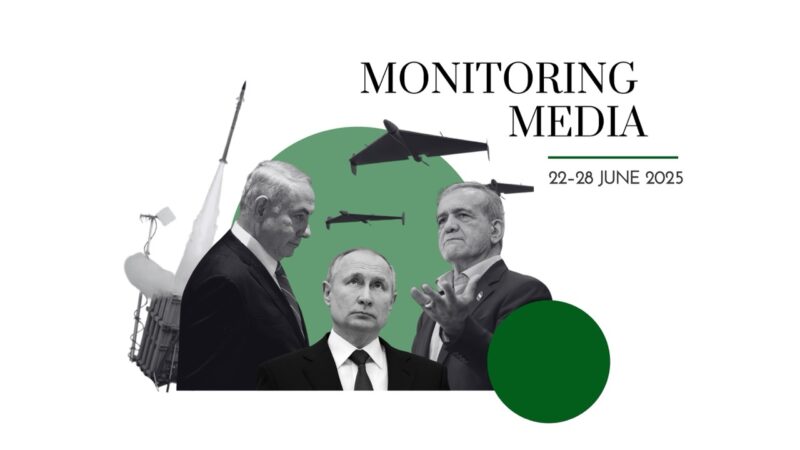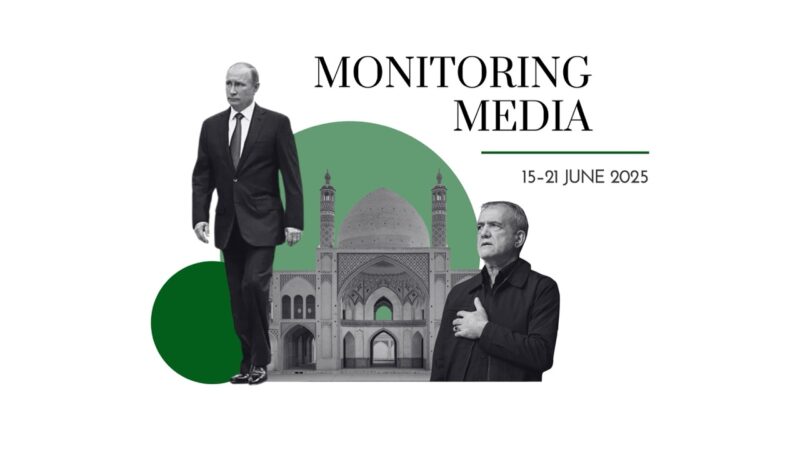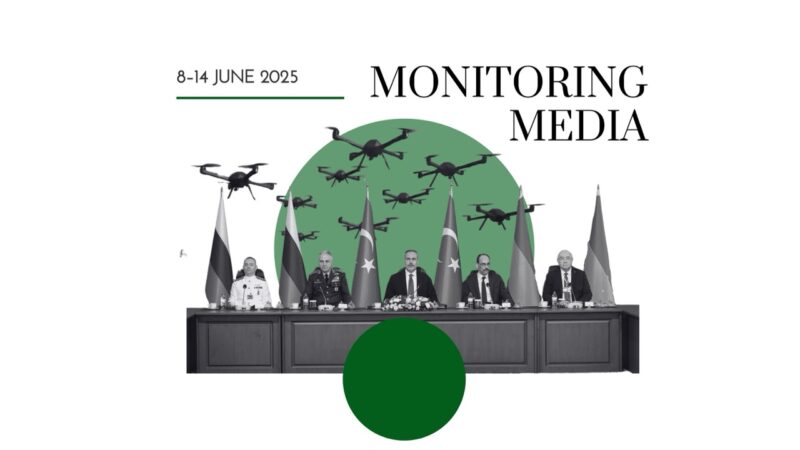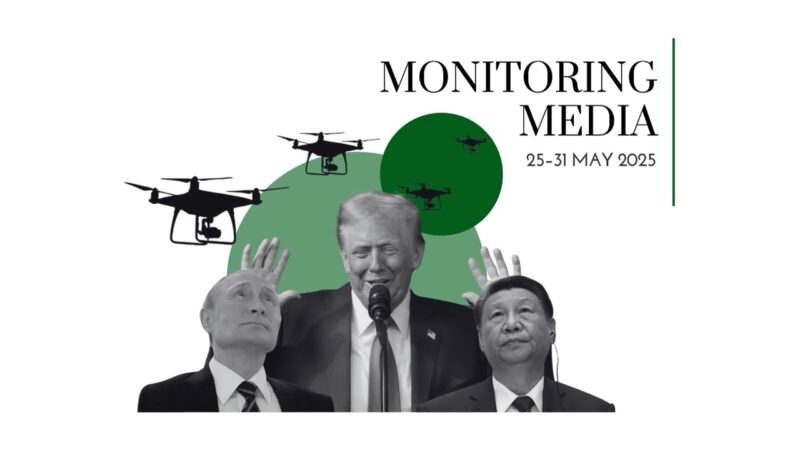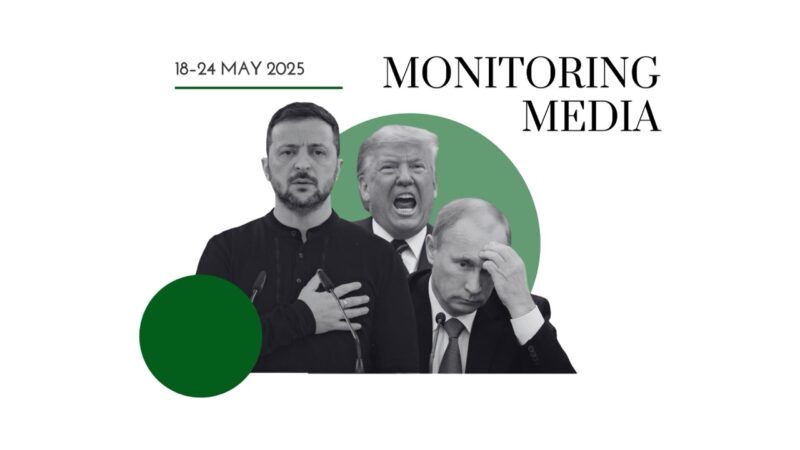Kremlin towers vie for power

CIUS weekly report on North American media coverage of Ukrainian affairs, 14–20 January 2024
Three publications (The National Interest, The Globe and Mail, The Economist) were selected to prepare this report on how Ukraine has been portrayed in the North American press during the past week. The sample was compiled based on their impact on public opinion as well as on their professional reputation, popularity among the readership, and topical relevance. These publications represent centrist viewpoints on the political spectrum.
This report covers only the most-read and relevant articles about Ukraine, as ranked by the respective North American publications themselves in the past week. Its scope covers promoted articles on home pages and articles from special sections on Ukraine, with the hashtag #Ukraine, from the paper editions of the publications, and about Ukraine from opinion columns and editorials.
Topics featured in the selected articles:
- The world and Ukraine: EU should be ready to supply Ukraine with weapons on its own.
- Russia at war: Canada well positioned to lead in the confiscation of Russian assets; Kremlin power struggle heats up; Russia wields nuclear weapons as instruments of diplomacy.
Main arguments:
EU should be ready to supply Ukraine with weapons on its own. The editorial board of The Economist argues that the European Union might be left alone to provide Ukraine with weapons. In a war of attrition the side with the best military-industrial complex usually wins, provided that there is parity of forces, so in this dimension Kyiv is inferior to Moscow, given that the Russian economy is 14 times larger than Ukraine’s. Nevertheless, together the allied Western economies are so strong that this should not have been a problem—but the situation is actually the opposite. Internal problems have prompted Washington and Brussels to delay assistance. According to the Economist, the problem of supplying artillery shells is illustrative: “At the height of Ukraine’s summer counter-offensive, it was using some 7,000 a day, significantly more than the Russians. This has reversed: since last month, while Ukrainian forces have been rationed to 2,000 shells a day, the Russians have been firing five times that number.” And furthermore, “Russia has increased military spending by 68% this year, reaching 6.5% of its GDP. According to Estonia’s ministry of defence, Russian production of artillery munitions will reach 4.5m units this year.” European munitions producers are not yet able to compete with Russia in output volume; this threatens Ukraine’s victory in the war and the security of Europe itself. The editorial board declares that “Europe will struggle to keep Ukraine in the fight this year if American assistance dries up. In the longer term, with American support growing uncertain, the continent has no option but to rebuild its defence industry.”
Canada’s task is to lead in the confiscation of Russian assets. Lloyd Axworthy and Fen Olser Hampson (Globe and Mail) emphasize that the confiscation of Russian assets in Ukraine’s favour is a necessary decision. Such a move would demonstrate the G7’s commitment to Kyiv and help it to win the war. However, such a decision is hampered by “pettifogging, foot-dragging, and intra-group divisions.” While Canada and the United Kingdom support it, Belgium is strongly opposed to confiscation. The United States and Japan are still undecided, while Germany, France, and Italy are hesitant because of the threat to their companies still doing business in Russia. According to the authors, “Canada needs to challenge these self-interested obstructions.” After all, Ottawa has already taken a number of steps in this direction: announced “changes to its sanctions legislation in 2022 as well as the forfeiture of some $26 million in a Canadian company owned by sanctioned Russian oligarch Roman Abramovich” and “seized a Russian-owned heavy-lift cargo jet with plans to transfer it to Ukraine.” The seized assets should be spent not only on military operations but also on the socio-economic needs of Ukrainians. Serious funding shortfalls have already led to the degradation of Ukraine’s social, educational, and healthcare systems, as well as poverty among Ukrainians: “Estimates suggest that 50 per cent of Ukrainian households are barely eking out a subsistence living, and roughly a quarter of the population can barely put food on the table.” According to Axworthy and Olser Hampson, “Canada would do well to remind nervous Europeans that this is no time to go wobbly and appease Mr. Putin, because the future of Ukraine—and Europe—now hangs in the balance.”
Kremlin power struggle heats up. Chris Monday and Andre C. Kuchins (National Interest) continue to discuss what the power architecture might look like in a post-Putin Russia. In the second part of their series, they argue that neither Nikolai Patrushev nor Dmitry Patrushev are real candidates for the Kremlin’s leadership—in fact, their personal influence is not enough to maintain their positions after Putin. Moreover, neither Nikolai nor Dmitry have sufficient media support, with minimal media presence and even occasional criticism on national television. Third, the roles they play in the Kremlin do not make them suitable as Putin’s successors: Nikolai Patrushev is a “Grim Reaper of ‘wet work,’” and Dmitry Patrushev is the “Kremlin’s Whipping Boy.” According to the authors, the Patrushevs’ isolation and tensions with other Kremlin clans may ultimately lead them to the same fate as “fearsome enforcers whose power derived exclusively from the ruler: Johann von Biron, Alexei Arakcheyev, Alexander Benckendorff, Lavrentiy Beria, Alexander Korzhakov, and others.” In sum, therefore, without Putin’s outright {endorsement OR blessing} the Patrushev clan “would suffer a fate similar to that of Lavrentiy Beria, Stalin’s notorious NKVD chief, who was tried and executed following the dictator’s death in 1953.”
Nuclear weapons are wielded as instruments of Russian diplomacy. Mark B. Schneider (National Interest) argues that nuclear weapons are unfairly applied as instruments of Moscow’s pressure in the international arena. Nuclear rhetoric also allows the Kremlin to consolidate its own population, claiming to them that “it is only Russia’s strategic nuclear forces that ‘Saved Russia From Being Erased From [the] World Map.’” Moscow began to systematically threaten with nuclear weapons after it invaded Crimea in 2014, and today, “high level Russian nuclear threats are commonplace.” Then, Russia’s full-scale invasion of Ukraine in 2022 was also accompanied by President Putin’s nuclear threat, “which was repeated frequently.” According to Schneider, the aim of such actions “is nuclear coercion.” Putin’s nuclear threats associated during the Russo-Ukrainian war have been mainly aimed at “the United States and NATO”—specifically in order to deter “Western assistance to Ukraine.” With the lowest nuclear weapons use threshold of any country in the world, Russia’s tactic has been successful in limiting the scope of Western assistance. Furthermore, the Kremlin’s nuclear doctrine involves an “escalate to de-escalate” or an “escalate to win” strategy. With Russia’s conventional army weakened by its war against Ukraine, Moscow is becoming increasingly dependent on nuclear weapons and has ramped up development of new types of weapons capable of carrying nuclear weapons. Schneider concludes, “It is still possible that Russia will use nuclear weapons against Ukraine. The United States and NATO are doing almost nothing to deter nuclear escalation.”
